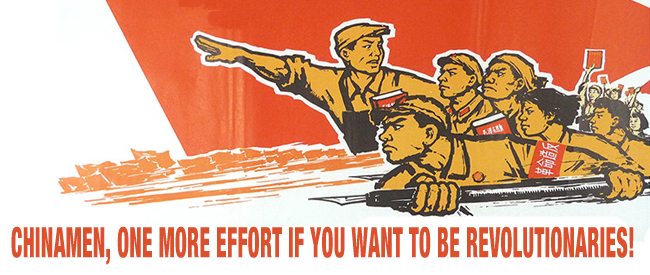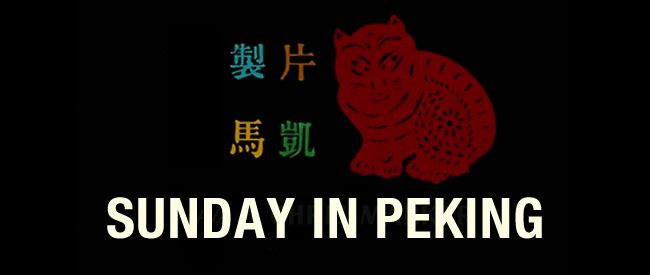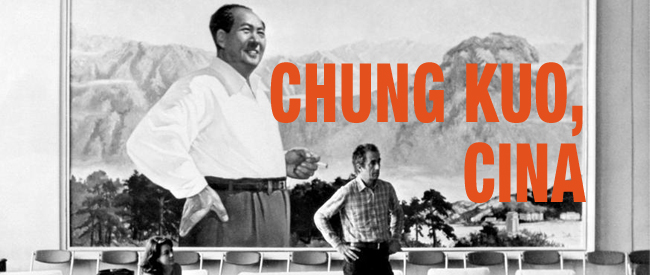This February, the Spectacle goes against the party line.
From the 50s to the 70s, Mao had to deal not only with the landlords, the compradors, and all the other running dogs of the international bourgeoisie, but also with foreign filmmakers seemingly bent on making a mockery of the sincere efforts of the Chinese communists to build a new society out of the ruins of the old. Before and during the Great Proletarian Cultural Revolution, these camera-wielding counterrevolutionaries exposed Chinese everyday life as less-than-radically-transformed in many of its aspects, and contributed to a worldwide demystification of the processes of labor-aristocratization and bureaucratization then taking place in that vast country. Some did it with more polemical intent than others. For a cross-section of the different critical attitudes then circulating on the subject of Communist China, this series brings together the naïve, the sarcastic, and the acerbic.

CHINAMEN, ONE MORE EFFORT IF YOU WANT TO BE REVOLUTIONARIES!
a.k.a. Peking Duck Soup; Chinois, encore un effort pour être révolutionnaires!
Dir. René Vienet, 1977
France, 112 mins.
In English
WEDNESDAY, FEBRUARY 5 – 7PM
Known primarily for his pioneering cinematic détournement Can Dialectics Break Bricks?, which put Situationist slogans in the mouths of kung-fu fighting Koreans, René Vienet also wrote Enragés and Situationists in the Occupations Movement, one of the most comprehensive first-hand accounts of the events of May ’68 in France. A sinologist, Vienet was expelled from China while on a study trip in 1966, and was subsequently fired — twice! — from his post at the French National Center for Scientific Research for his attacks on defenders of Mao within their ranks.
In CHINAMEN, ONE MORE EFFORT IF YOU WANT TO BE REVOLUTIONARIES!, Vienet uses subverted archival footage and a sardonic voiceover to denounce Mao’s deformed socialist state machine as a grotesque caricature of a revolutionary society. Whereas his previous two détournements spoofed kung-fu movies and pinku flicks, this one attacks the political documentary and disassembles it into its constituent tropes. Legendary French literary and film critic Georges Charensol called it “in my opinion the best film in the history of cinema.”
SUNDAY IN PEKING
a.k.a. Dimanche à Pekin
Dir. Chris Marker, 1956
France, 18 mins.
In French with English subtitles
In 1956, recently beatified cinema-essayist Chris Marker spent a couple of weeks in Peking and shot this travelogue. As the title suggests, the subject is a single, typical day in the life of the Chinese capital. Marker turns his camera on mask-wearing mysophobes, top-level athletes, and sword-wielding retirees to weave a magical, embellished tapestry of Peking in which the most egregious Orientalist illusions are deployed with sarcastic relish. Marker’s irony was not noticed by everyone: unlike the other two filmmakers in this series, Marker was rejected not by the Chinese government but by the Berlin Film Festival for what it perceived as shameless Communist propaganda.
The highly personal lyricism of Marker’s commentary in Sunday in Peking, newly translated and subtitled for the Spectacle, shows the influence of Alain Resnais, with whom Marker had just collaborated on STATUES ALSO DIE and NIGHT AND FOG. The score is conducted by famed French New Wave composer Georges Delerue, whose distinctive scores include SHOOT THE PIANO PLAYER and CONTEMPT. Other collaborators include Agnès Varda, who acted as the film’s “sinological advisor” — whatever that entailed.
Special thanks to Allison Kruse for the new translation.
CHUNG KUO – CINA
Dir. Michelangelo Antonioni, 1972
Italy, 208 mins.
In Italian with English subtitles
THURSDAY, JANUARY 6, 7PM
More reviled by the Chinese government than possibly any other filmmaker in history is Michelangelo Antonioni. What could have led Antonioni, not known for his outspoken criticism of the Chinese or any other state, to be condemned to a massive campaign of public ridicule and denunciation diffused throughout the largest population in the world? Answer: CHUNG KUO – CINA, a three-hour long documentary commissioned by the Chinese embassy in Rome and RAI Television during the dusk years of the Cultural Revolution.
Shot over 22 days in Beijing, Henan Province, Suzhou, Nanjing, and Shanghai, with a strict itinerary imposed by the Party officials appointed to guide Antonioni’s crew, CHUNG KUO was supposed to become a panoramic document of socialist progress. But through a series of tactical deviations from his assigned trajectory, Antonioni ended up producing a touchingly naïve and intimate portrait of everyday life in early 1970s China. The film’s decidedly unmonumental character provoked severe indignation from the Party: the Chinese ambassador led his staff in a walkout at a screening in Washington, newspaper editorials with titles like “A Vicious Motive, Despicable Tricks” were collected into a 200-page booklet called The Chinese People Will Not Stand for Being Denigrated: A Collection of Criticisms of Antonioni’s Anti-China Film, and even a taunt-song called “Let’s Make Antonioni Mad” was widely taught to Chinese schoolchildren.
From the first images of an old man doing tai chi while riding a bike, to an eye-popping cesarian section performed with nothing but acupuncture needles for anesthesia, CHUNG KUO is amazing as a travelogue, a historical document, and a study in the minutiae of human interaction.


